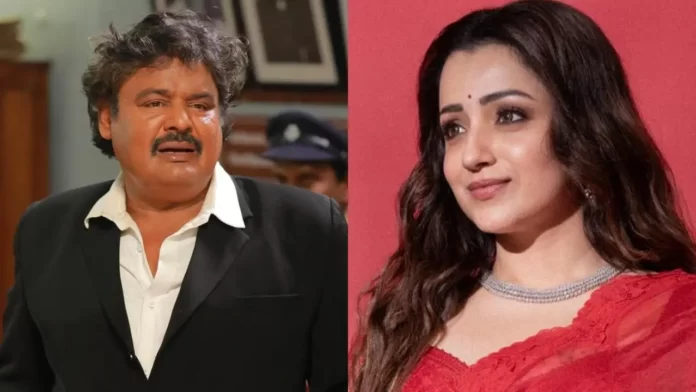In a recent development, the Madras High Court has levied a fine of Rs 1 lakh on actor Mansoor Ali Khan while simultaneously rejecting his plea seeking permission to file a defamation suit against actress Trisha Krishnan. The court’s decision comes as a notable legal setback for Khan in a case that has garnered attention for its twists and turns.
The legal battle between Mansoor Ali Khan and Trisha Krishnan revolves around alleged defamatory statements made by Khan against Trisha during a television show. The court’s imposition of a substantial fine on Khan suggests a stern stance on unwarranted public statements that can harm an individual’s reputation.
The rejection of Mansoor Ali Khan’s plea to file a defamation suit against Trisha Krishnan implies that the court found insufficient grounds to entertain such legal action. This decision underscores the judicial scrutiny applied to defamation cases, emphasizing the necessity of substantial evidence and valid claims to pursue legal recourse.
Defamation cases in the public eye often attract attention due to the high-profile nature of the individuals involved. In this instance, the legal proceedings have become a matter of public interest, shedding light on the complexities of navigating personal disputes within the legal framework.
More About Mansoor Ali Khan
Mansoor Ali Khan’s alleged defamatory remarks on a public platform triggered a legal response from Trisha Krishnan, who sought legal recourse to protect her reputation. The court’s decision to impose a monetary penalty on Khan reinforces the significance of responsible communication, especially in the public domain.

The legal landscape surrounding defamation cases requires a delicate balance between freedom of expression and protection against unwarranted harm to an individual’s reputation. The imposition of a substantial fine on Mansoor Ali Khan sends a clear message about the consequences of making defamatory statements without proper basis or evidence.
The rejection of Khan’s plea to file a defamation suit against Trisha Krishnan also highlights the legal threshold for initiating such legal action. Courts, in their evaluation of defamation claims, scrutinize the merits of the case, ensuring that the pursuit of legal action is justified and substantiated.
Public personalities, including actors and celebrities, often find themselves entangled in legal battles over statements made in the public domain. The legal proceedings between Mansoor Ali Khan and Trisha Krishnan serve as a reminder of the legal responsibilities associated with public statements and the potential legal consequences for those who overstep boundaries.
The Madras High Court’s decision carries implications not only for the immediate parties involved but also for the broader discourse on responsible communication. It underscores the need for public figures to exercise caution and adhere to ethical standards when expressing opinions or making statements that could impact the reputation of others.
Further, the Madras High Court’s imposition of a Rs 1 lakh fine on Mansoor Ali Khan and the rejection of his plea to file a defamation suit against Trisha Krishnan underscore the legal complexities surrounding public statements. The case serves as a legal precedent, emphasizing the importance of responsible communication and the need for valid grounds when pursuing defamation claims in the public eye.

The legal ramifications of the Madras High Court’s decision extend beyond the immediate financial penalty imposed on Mansoor Ali Khan. This verdict signals a broader stance on maintaining ethical standards in public discourse, especially within the realm of the entertainment industry. As public figures wield considerable influence, the court’s decision acts as a deterrent against the misuse of that influence to tarnish the reputation of others.
Defamation cases often involve intricate legal arguments, and the rejection of Mansoor Ali Khan’s plea sheds light on the court’s careful consideration of the evidence presented. The stringent evaluation process underscores the judiciary’s commitment to upholding justice while safeguarding the principles of free expression.
Trisha Krishnan’s legal victory in this case reaffirms the right of individuals to seek redress for harm caused to their reputation. The legal system, by refusing permission for a defamation suit, emphasizes the necessity of due diligence before initiating legal proceedings. This legal precedent sets the bar for the burden of proof required in defamation cases, emphasizing the importance of presenting substantial evidence to support claims.
The public nature of the legal battle between Mansoor Ali Khan and Trisha Krishnan also prompts reflections on the role of the media in such instances. The media’s responsibility in reporting legal proceedings is critical, as it influences public perception and can impact the lives and careers of those involved. The court’s decision becomes a pivotal moment in shaping not only the narrative of this specific case but also the broader discourse on responsible reporting and legal accountability.
As the legal drama unfolds, it serves as a case study for individuals in the public eye to exercise prudence in their public statements. The consequences of defamatory remarks, as demonstrated by the court’s decision, extend beyond the immediate financial penalty. They include reputational damage and potential long-term consequences for the individual responsible for such statements.
In the larger societal context, the Madras High Court’s decision contributes to ongoing conversations about legal ethics, freedom of expression, and the balance between protecting one’s reputation and upholding the principles of free speech. Legal battles involving public personalities underscore the complexities inherent in navigating personal disputes within the legal framework, and they offer valuable insights into the evolving nature of legal precedents in defamation cases.

